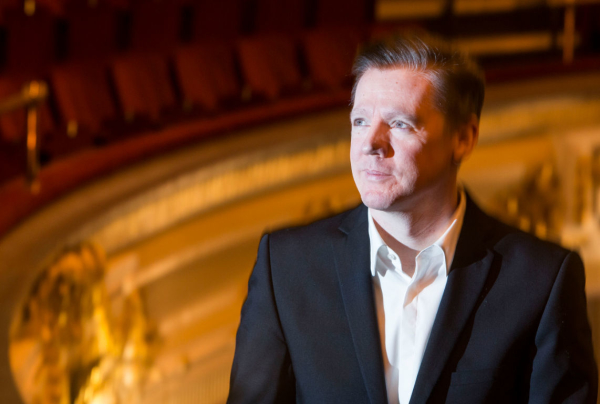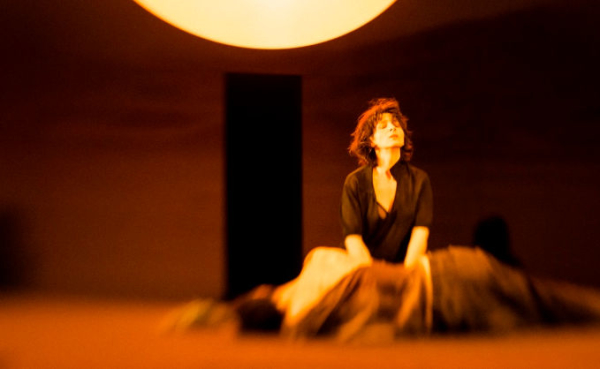Fergus Linehan: 'I want people to know what the Edinbugh International Festival stands for'

© Stuart Armitt
Sir Brian's drama programme wasn't half bad – though not half as good as his predecessor's, John Drummond's, who championed the Rustaveli Teatre of Georgia and the Glasgow Citizens at their peak – bringing Mark Morris five years running, Catalan maestro Calixto Bieito, dance legend Pina Bausch and (admittedly disastrously, twice) Robert Lepage; now Linehan is sticking with Lepage, as well as programming Simon McBurney's Complicité for the first time, the Citizens in Alasdair Gray's monster epic Lanark, adapted by David Greig (it's the Citizens' 70th anniversary year, Gray's 80th), and the Volksbühne, Berlin, in a bonkers surreal play, Murmel Murmel, that reiterates that one word in the title for 80 minutes while allegedly reducing the audience to hysterics.
Most pointedly, perhaps, he's presenting a new opera written by his fellow Irishman, Enda Walsh, The Last Hotel, with music by Donnacha Dennehy, that "combines post-minimalist overtones with a very Irish sensibility" in a weird tale of car park collusion, blood, murder and guilt. "I look forward to safeguarding," says Linehan over a late lunch in Covent Garden before the launch, "the founding principles of the EIF in ways which are engaging and relevant." And as someone deeply involved in our culture (Irish and British) over the past 20-odd years, he should know; put it this way, if he doesn't, he's in the wrong job.
Fergus is a brave broth of a boy – now married for the second time with a baby daughter – whom I've known since he ran the Dublin Theatre Festival (very well), going on to the Sydney Festival and Opera. His father, also Fergus, is a distinguished writer and journalist in Dublin, while his mother, Rosaleen Linehan, is a peerless actress, one of the best ever Winnies in Happy Days, his elder brother, Hugh, an editor on the Irish Times, his younger brother, Conor, a composer and concert pianist. He's less hung up on high culture, more dedicated to European collaboration, music of all sorts – offering a complete Beethoven piano sonatas cycle, Franz Ferdinand and Sufjan Stevens alongside a radical Marriage of Figaro from Budapest and a Berlin Magic Flute (conceived by our own critically acclaimed 1927 company) referencing Buster Keaton and Weimar cabaret – and making the most of modern dance.
'We can't afford to be a sidebar to what's happening in the world'
This latter obsession may lead to a reconfiguring, and rationalisation, of the barn-like Playhouse in Edinburgh for a new dance venue next year. "The idea of high culture is now a perjorative, even if you can clearly say what it is. The key EIF founding gesture of internationalism, as opposed to globalism, in 1947 was the invitation to Bruno Walter and the Vienna Philharmonic, half of them signed-up Nazi party members; my grandmother wouldn't let us buy a Japanese car in the 1990s! But internationalism has changed. I find, wherever I go, that most artists have the same frame of reference, we all look at things online now. It's harder to find a new company with a totally new aesthetic, a first time Mnouchkine, for instance, or a new Pina Bausch.
But aren't festivals themselves a thing of the past, or at least offering new models, as at Latitude, or the Manchester biennial? "The big outdoor music festivals are disappearing and the growth is in new specialised festivals, as at Manchester, or in baroque music or comedy. I love Manchester; I envy them, just ten exquisite projects every two years. But Edinburgh is the UK's festival, and has been for a long time. You've always had Claudio Abbado here, or Charles Mackerras, the core of people's musical consumption; but not always the theatrical equivalent of that." I remind him that Ian McKellen made his breakthrough in Edinburgh with Prospect Theatre Company, and he rejoins that Beyond the Fringe, the start of modern satire and stand-up was on the EIF, not the Fringe. "But it is ludicrous we've had no Deborah Warner [her Kick Theatre was on the Fringe], Katie Mitchell, Declan Donnellan, Mark Rylance, Simon Russell Beale or Nick Hytner."

© Jan Versweyveld
I suggest that Juliette Binoche in Antigone might be improved before Edinburgh in the sound and visuals departments but he's diplomatically defensive: "I love it! But I can see how it might irritate the hell out of people. It's very trippy and claustrophobic, but this is what power is actually like; it's not people running around and shouting but saying quiet, menacing things under their breath. It's a very stylised thing Ivo van Hove's gone for here, quite an extreme reading of the piece."
Does he envisage a return to basics after the digital and technical revolutions in theatre? "It's interesting that both Lepage in 887 – that's the number of the apartment he lived in as a child – and McBurney in The Encounter play on the idea of fiction and theatre as an act of memory. Now that we document everything, what is the role for memory? I see this preoccupation everywhere now. People have gone through the excitement of all the technical bells and whistles and are becoming more refined in how they use technology. Audio is the most fascinating area; everyone's mic'd and theatre acting is much closer to film acting."
The EIF budget is around £11m, £5m of that coming from the government and Edinburgh City Council, the rest split between box office (£3.5m) and fundraising (£2.5m). "We are prestigious, and I want people to know what the EIF stands for, and I'm not quite sure that's the case yet in the younger generations. We can't afford to be a sidebar to what's happening in the world; I've seen fantastic things in Edinburgh that were precisely that… and I'm not at all sure that's ever what we were intended to be."
The Edinburgh International Festival 2015 runs in the Scottish capital from 7 to 31 August. For more information on the programme, click here










